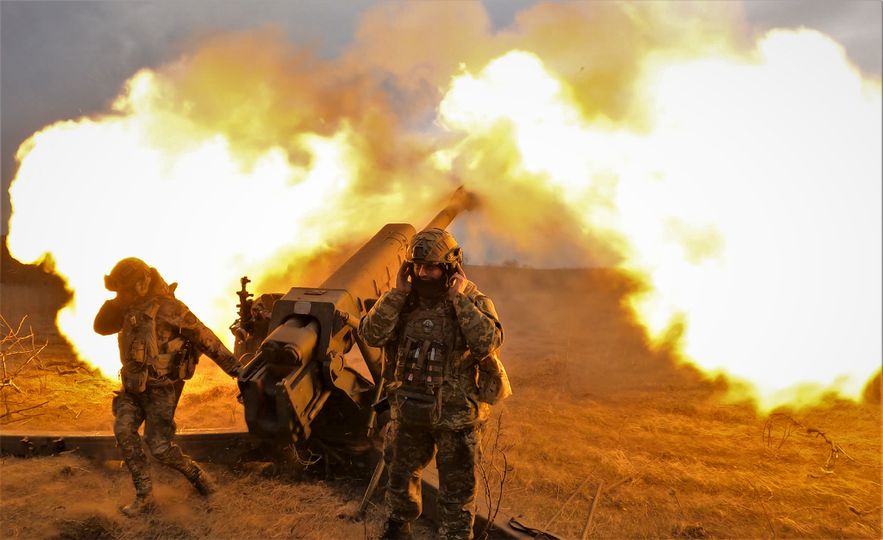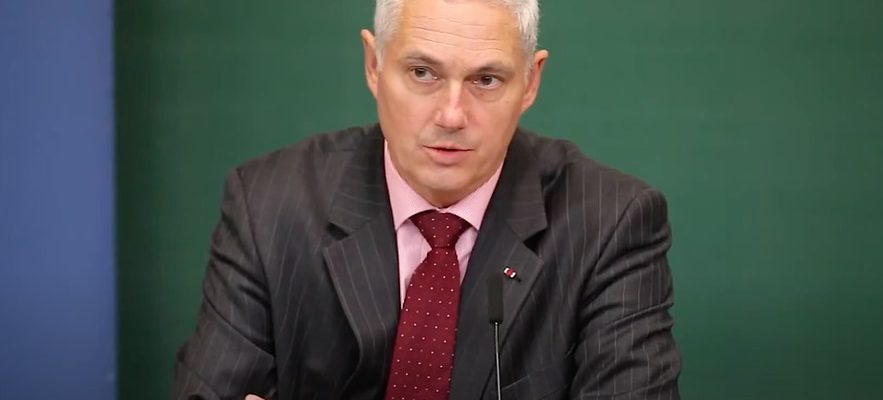The new Russian offensive seems to be in trouble. For the time being, the multiple assaults launched in recent weeks by Russian forces around the city of Bakhmout have been summed up more as territorial “nibbling” than a real breakthrough of the Ukrainian lines. After more than a year of conflict, do they still have the capacity to make progress on the Ukrainian front? “The Russian army has lost much of its offensive capability. Although it still has a large force, it is today much less powerful than it was before the invasion began” , judges General Michel Yakovleff, former vice-chief of staff of Shape, the Supreme Allied Command for NATO operations. Interview.
L’Express: How is the new Russian offensive going?
General Michel Yakovleff: Not very well. This offensive began in January and already seems to be running out of steam. Apparently, the Russians had in mind to crack the Ukrainian army on the entire front line, but in the end they were the most exhausted in this effort. Russian forces, for example, are beginning to face ammunition shortages, especially in artillery shells. At the same time, it should be noted that their territorial gains are ridiculous: there has been no significant progress.
How to explain such an inconclusive result?
This is essentially due to a completely unsuitable strategy. Already, the Russians had not concentrated enough resources to win. Then, they diluted these means on the whole of the front line and locked themselves in fights against very well defended positions, for example in Bakhmout, where they were awaited firmly. Result: the Russian offensive already seems to be reaching its peak. They have burned all their cards, which could allow Ukraine to regain the advantage in the coming months.
Should we still expect Wagner’s forces to seize Bakhmout soon?
The city is relatively close to an encirclement, so it cannot be ruled out. However, we can largely relativize the success that this would represent for the Russians. In reality, apart from a symbolic confrontation, the conquest of Bakhmout has become meaningless. The Russians would recover a few square kilometres, but that wouldn’t change much. It would be a Pyrrhic victory: the Russians squandered their soldiers and exhausted themselves for insignificant gain. With such a confounding cost-effectiveness ratio, we are close to the zero degree of military strategy.
General Michel Yakovleff, former vice-chief of staff of Shape, the Supreme Allied Command for NATO operations.
© / YouTube capture
Yet Russia has mobilized more than 300,000 troops since September. Should we conclude that the mobilization decreed by Putin is a failure?
Mobilization in itself is not a failure, but what Putin did with it is. His lack of strategic vision led him to squander a significant force. First of all, these new troops were not sufficiently well trained or equipped. Then the chain of command clearly overestimated what these soldiers were capable of dealing with the Ukrainians. The objectives set are not realistic and the Russian general staff does not give enough resources to its soldiers to achieve them.
More and more mobilized testify to a crying lack of ammunition and the total absurdity of certain orders. The Russian army again and again shows incredible incompetence. It was already the case in February 2022, so that means that in a year, she hasn’t learned much. Today, almost half of the mass of 300,000 men mobilized since September has been lost. They are not all dead, but many soldiers have been injured or are traumatized, exhausted. And unnecessary.
Is the growing rivalry between the Wagner militia and the regular army a symptom of these Russian difficulties?
Certainly. The boss of the Wagner group, Evgueni Prigojine, wanted people to believe that he had set up an elite troop in order to place himself on the Russian political spectrum. The problem is that he actually did not show great military skill. He had promised Bakhmout as a trophy to Putin, but he has lost many of his men without, for the moment, managing to take the city. The tensions we are witnessing between its militia and the Russian army show how sick the Russian regime is.
If you want unity of effort, you better have unity of command. The distribution of responsibilities must be clear and everyone must play their role. But this multifaceted Russian system, with different more or less competing factions, is deleterious. This undermines the unity of command and makes it impossible to optimize the use of resources – all the more so in a context where they are beginning to be scarce. Today, they are fighting for equipment or ammunition. From then on, the machine seizes up: there is a sub-optimal use of Russian resources, and, at the same time, a drop in the effectiveness of the forces that are deployed.

Ukrainian gunners fire on Russian positions near Bakhmout (east) on March 21, 2023
© / afp.com/Sergey SHESTAK
To what extent do these shortages handicap the Russian forces?
They are already disabled, and it will get worse. If there are Ukrainian offensives, the Russians will not have many resources to deal with them. They certainly have ammunition and missile production capabilities, but not enough to keep up. We see, for example, that Russian strikes on Ukrainian territory are much less frequent today because their stock of missiles has been greatly reduced. Ditto for artillery ammunition. In this situation, the Russian army has no choice but to downsize.
Yet another blow for the Russians…
Absolutely. The Russian army has lost much of its offensive capability. Although it still has a significant force, it is today much less powerful than it was before the start of the invasion. And she is deeply demoralized by the way this war is being waged. Politically, can the Russian power afford to continue in this way? I’m not sure. Such a show of incompetence could end up weakening Putin and fracturing his regime. Let us remember that in 1917, the Russian army was still substantial, but it gradually stopped fighting, faced with the scale of the carnage and the internal revolution. A year later, the Treaty of Brest-Litovsk was negotiated with the German Empire. If a similar situation occurred today, Putin’s regime would be doomed.
Could a potential arms delivery from China be a game-changer?
Everything depends on the nature of the armaments that would be delivered. But if they are substantial, it could be a game-changer. First of all, it could give Putin and his army hope in their chance to win the war. This is a psychological factor that should not be overlooked. Then, in a more down-to-earth way, if China put its armament production capacities at the service of Russia, this could make it possible to solve the problem of the depletion of Russian resources. And the Westerners would then have difficulty in aligning themselves. Such an event could relaunch the war for the benefit of the Russians. However, it is by no means certain that China would take the risk of supporting Russia so openly.
At the same time, the Ukrainians announced their intention to launch a counter-offensive in the spring. Can they expect better results than the Russians?
I think so, because the Ukrainians will launch a counter-offensive only when they are certain of having a good chance of succeeding. Since the beginning of the conflict, the Ukrainian forces have been much more rational and reasonable than those of Putin. Will the Ukrainians consider that they have sufficient resources to attempt a counter-offensive? It’s a possibility. Western equipment that has been provided to them – such as heavy tanks, infantry fighting vehicles or long-range rockets – could help them, although I’m not sure that’s enough. In any case, if they manage to break through the Russian defense lines and, for example, to cut the Russian presence in the south of the country in two, it would be devastating for Putin’s forces.
